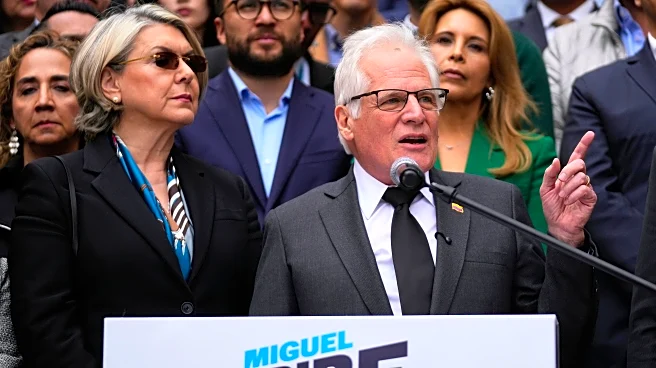TOKYO (AP) — Global shares mostly advanced Tuesday after President Donald Trump delayed raising tariffs on China for another 90 days.
France's CAC 40 gained 0.1% to 7,706.59, while Germany's DAX shed 0.4%
to 23,990.54. Britain's FTSE 100 rose 0.3% to 9,154.82. The futures for the S&P 500 and Dow Jones Industrial Average were up about 0.1%.
In Asia, Tokyo's benchmark Nikkei 225 jumped 2.2% to finish at 42,718.17, topping its past all-time record. Toyota Motor Corp.'s shares surged nearly 3% and other heavyweight shares also saw big gains after the U.S. confirmed that tariffs on imports from Japan would be taxed at 15% and not subject to “stacking” the rate on top of already existing duties.
Honda Motor Co.'s stocks finished 2.6% higher, chips maker Tokyo Electron gained 1.1%, while electronics maker Sharp's stocks jumped 11%. Sanrio, the company behind Hello Kitty, saw its shares surge 16%, while watchmaker Seiko added nearly 14%.
Hong Kong's Hang Seng rose 0.3% to 24,969.68, while the Shanghai Composite climbed 0.5% to 3,665.92.
Trump signed an executive order Monday putting on hold a possible showdown between the world’s two major economies to allow time for more talks on a broad trade agreement. Without an extension, taxes on Chinese imports might have jumped from an already high 30%.
Beijing could have responded by raising retaliatory levies on U.S. exports to China but it issued a similar statement about the extension of the tariff pause.
The reprieve makes room for a possible deal with Trump, but it also prolongs the uncertainty that has bedeviled companies since the president began escalating his trade war.
“The extension isn’t about goodwill; it’s about keeping oxygen in the room for deals that matter,” Stephen Innes of SPI Asset Management said in a commentary.
Elsewhere in Asia, Australia’s S&P/ASX 200 rose 0.4% to 8,880.80. South Korea’s Kospi lost 0.5% to 3,189.91.
On Monday, the S&P 500 lost 0.3%, the Dow industrials fell 0.5% and the Nasdaq composite declined 0.3%.
Later Tuesday, the U.S. government was due to report on inflation across the country in July. Economists expect the data to show U.S. consumers had to pay prices for groceries, gasoline and other costs of living that were 2.8% higher than a year earlier, a slight acceleration from June’s 2.7% inflation.
Inflation has remained above 2%, even if it has improved substantially from its peak above 9% three years ago. And the worry is that Trump’s tariffs could push prices still higher.
That in turn is raising fears about a potential, worst-case scenario called “stagflation” where the economy stagnates but inflation remains high. The Federal Reserve has no good tool to fix both at once, and it would need to concentrate on either the job market or inflation first. But helping one of those areas by moving interest rates would likely hurt the other.
In energy trading, benchmark U.S. crude fell 16 cents to $63.80 a barrel. Brent crude, the international standard, lost 9 cents to $66.54 a barrel.
In currency trading, the U.S. dollar edged up to 148.46 Japanese yen from 148.15 yen. The euro cost $1.1617, inching down from $1.1618.












